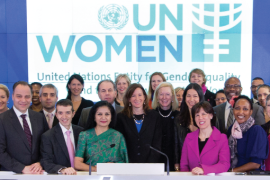The skewed number of women in research and science, technology, engineering, and mathematics (STEM)-related fields is a problem that has been highlighted in the last few years. However, the problem continues to exist and grow. Between 1901 and 2019, 334 Nobel Prizes have been awarded to 616 laureates in Physics, Chemistry, and Medicine, of which only 20 have been won by 19 women.
Family pressure, patriarchal society, and not enough suitable opportunities are some of the major reasons that researchers cite for the deep-rooted problem. However, lack of proper guidance and role models is an underestimated factor that contributes hugely to the underrepresentation of women in research.
Intending to drive change, the Indian Institute of Technology (IIT), Madras, Friday, April 23, 2021, launched the STEM women scholars’ and researchers’ development (STEWARD) initiative focussed on mentoring women Ph.D. research scholars at all levels.
“Even after getting a Ph.D. from reputed institutions, women scholars often give up on their careers in research. The enrolment is fairly good at the higher education level (PG and Ph.D.), but retaining a research career is always tough for women. The major reason is that there is no set path after education. Till the time students are pursuing degrees, they are following a prescribed curriculum. But once the degree concludes, students especially women candidates feel lost about their next step,” Indumathi Nambi, professor, Department of Civil Engineering, IIT Madras, the coordinator of the initiative said.
UNESCO data from 2014-16 show that only around 30 percent of female students select STEM (science, technology, engineering, and mathematics)-related fields in higher education. Female enrolment is particularly low in information technology (3 percent), natural science, mathematics, and statistics (5 percent), and engineering and allied streams (8 percent).
Under the program, present Ph.D. scholars at IIT Madras are connected with alumni working in similar domains. The mentees receive daily guidance and mentorship to determine their path while pursuing research. It introduces them to role models in their domain and allows them to receive emotional and professional support.
The target mentees under the program include junior women faculty, women research scholars/alumnae, those who continue to academic, R&D careers and teaching positions, and those who drop out or do independent research. Presently, the mentor-mentee model is limited to IIT Madras scholars and alumni, but the institute plans to share the blueprint of the model with other institutes in the future.
“India has over 300 million women under 25 years of age. Tapping this potential is key to national research powerhouse status. It is a colossal waste of energy to force these women to surmount the inequities they currently face,” said Meera Sitharam, 1984 BTech Alumna and Professor of Computer Science and Mathematics, University of Florida. Sitharam is also coordinating the mentorship initiative.
Nambi said that while such an initiative can help change the mindset of scholars, inclusive policies and employment practices are needed to bring change at ground zero.
“The research sector has a gap concerning PoSH policies. There needs to be greater sensitization as labwork continues at odd hours where men and women work together. Childcare facilities at institutes must also change. Most daycare centres work from 10 am-5 pm, but scientists cannot shut the labs based on when the sun goes down. Institute must also provide a separate budget to women scholars who travel for research purposes as they often travel with their kids. Once these fundamental problems get addressed in the majority of Indian institutions, the research ecosystem will flourish with full potential,” added Nambi.





Comments are closed.